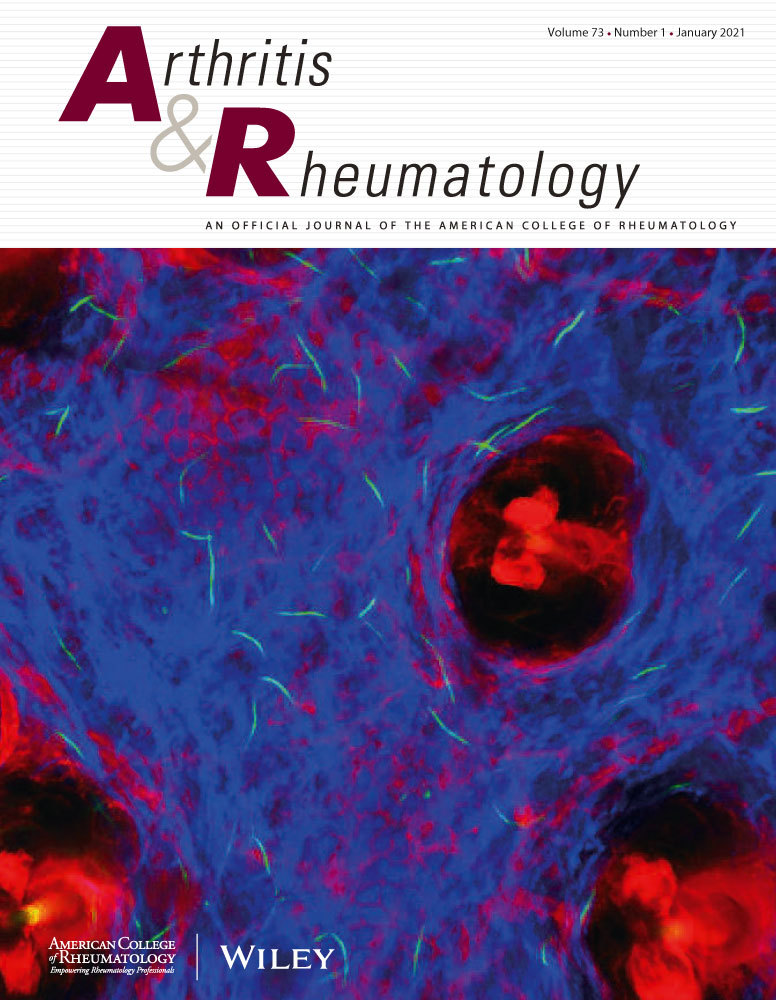Serum cytokine profiling differentiates underlying diseases in cytokine storm syndrome.
IF 10.9
1区 医学
Q1 RHEUMATOLOGY
引用次数: 0
Abstract
OBJECTIVE Cytokine storm syndrome (CSS), commonly associated with hemophagocytic lymphohistiocytosis (HLH), is a fatal hyperinflammatory syndrome. Differentiating the underlying diseases responsible for CSS is essential for timely therapeutic decisions. This study explored the clinical usefulness of serum cytokine profiling in distinguishing underlying diseases in patients with CSS. METHODS Serum samples were collected from 143 adult and pediatric patients with CSS and 22 healthy controls. The cohort included patients with various diagnoses of primary and secondary HLH, and Kawasaki disease (KD)-like hyperinflammatory syndromes. Serum levels of 48 cytokines were analyzed in 97 patients using a bead-based multiplex immunoassay (Luminex assay). Serum levels of IFN-α, IL-18, IL-6, CXCL9, and sTNF-RII were measured in 165 participants using enzyme-linked immunosorbent assay (ELISA). RESULTS Luminex assay categorized patients with CSS into five clusters based on serum cytokine patterns. ELISA revealed distinct cytokine patterns, wherein patients with histiocytic necrotizing lymphadenitis-associated HLH and systemic lupus erythematosus-associated-MAS showed elevated IFN-α; systemic juvenile idiopathic arthritis- and adult-onset Still's disease-associated MAS, XIAP deficiency with HLH, and NLRC4-associated autoinflammatory disorder exhibited higher IL-18 levels. Additionally, KD shock syndrome had higher IL-6 levels than the other groups. CXCL9 was significantly elevated in patients with virus-associated HLH, familial HLH, malignant lymphoma-associated HLH, and KD-MAS. Multisystem inflammatory syndrome in children and toxic shock syndrome also showed moderate elevations of CXCL9 and IL-6 levels. CONCLUSION Serum cytokine profiling effectively differentiates CSS subtypes, facilitating better diagnosis and personalized treatment strategies based on specific disease backgrounds.血清细胞因子谱分析可鉴别细胞因子风暴综合征的基础疾病。
目的细胞因子风暴综合征(CSS)是一种致死性高炎症综合征,常伴有噬血细胞性淋巴组织细胞增多症(HLH)。鉴别导致CSS的潜在疾病对于及时做出治疗决定至关重要。本研究探讨血清细胞因子谱在鉴别CSS患者基础疾病中的临床应用价值。方法收集143例成人和儿童CSS患者及22例健康对照者的血清样本。该队列包括各种诊断为原发性和继发性HLH以及川崎病(KD)样高炎症综合征的患者。使用基于头部的多重免疫分析法(Luminex assay)分析了97例患者48种细胞因子的血清水平。采用酶联免疫吸附试验(ELISA)测定165名受试者血清中IFN-α、IL-18、IL-6、CXCL9和sTNF-RII的水平。结果根据血清细胞因子的变化规律,slinex法将CSS患者分为5类。ELISA显示不同的细胞因子模式,其中组织细胞坏死性淋巴结炎相关HLH和系统性红斑狼疮相关mas患者显示IFN-α升高;全身性青少年特发性关节炎和成人发病Still病相关的MAS、XIAP缺乏症伴HLH和nlrc4相关的自身炎症性疾病表现出更高的IL-18水平。此外,KD休克综合征患者IL-6水平高于其他组。CXCL9在病毒相关性HLH、家族性HLH、恶性淋巴瘤相关性HLH和KD-MAS患者中显著升高。儿童多系统炎症综合征和中毒性休克综合征的CXCL9和IL-6水平也有中度升高。结论血清细胞因子谱分析可有效区分CSS亚型,有助于基于特定疾病背景的更好诊断和个性化治疗策略。
本文章由计算机程序翻译,如有差异,请以英文原文为准。
求助全文
约1分钟内获得全文
求助全文
来源期刊

Arthritis & Rheumatology
RHEUMATOLOGY-
CiteScore
20.90
自引率
3.00%
发文量
371
期刊介绍:
Arthritis & Rheumatology is the official journal of the American College of Rheumatology and focuses on the natural history, pathophysiology, treatment, and outcome of rheumatic diseases. It is a peer-reviewed publication that aims to provide the highest quality basic and clinical research in this field. The journal covers a wide range of investigative areas and also includes review articles, editorials, and educational material for researchers and clinicians. Being recognized as a leading research journal in rheumatology, Arthritis & Rheumatology serves the global community of rheumatology investigators and clinicians.
 求助内容:
求助内容: 应助结果提醒方式:
应助结果提醒方式:


